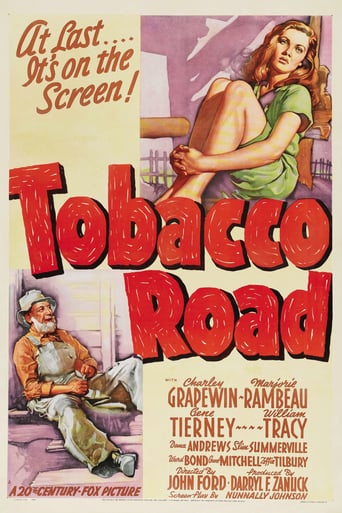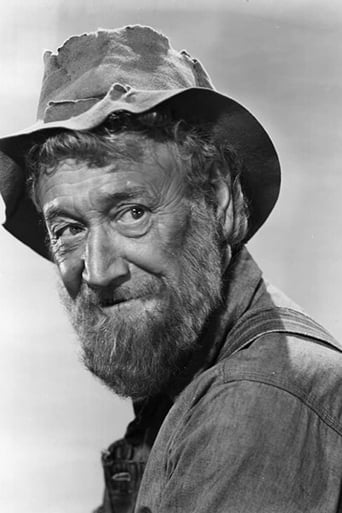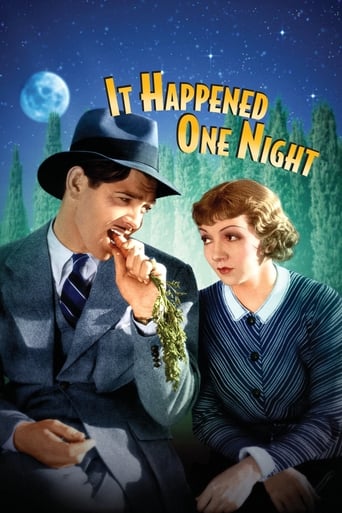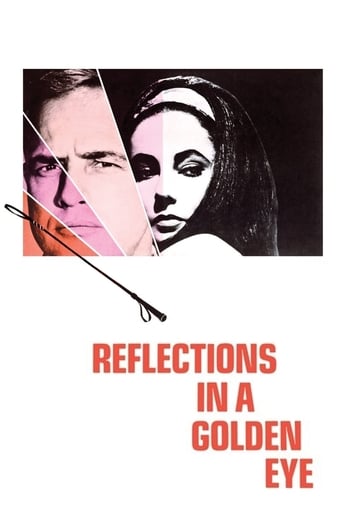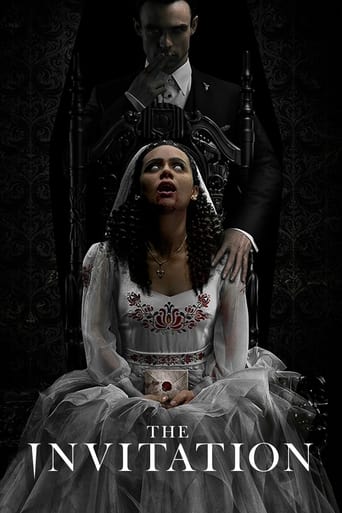Tobacco Road (1941)
Shiftless Jeeter Lester and his family of sharecroppers live in rural Georgia where their ancestors were once wealthy planters. Their slapstick existence is threatened by a bank's plans to take over the land for more profitable farming.
Watch Trailer
Cast


Similar titles
Reviews
Just perfect...
Good movie but grossly overrated
It's entirely possible that sending the audience out feeling lousy was intentional
The best films of this genre always show a path and provide a takeaway for being a better person.
I think one of the reasons this story of impoverished farmers in the Depression South fails is that there is practically no one in it that we good, hard-working, industrious, generous, compassionate, law-abiding, God-fearing Sons of the Earth can identify with.Except possibly for Elizabeth Patterson, Charley Grapewin's resigned and practical wife, the characters seem to have the minds of children. And not cute or charming children, but self-indulgent charlatans who steal, lie, bamboozle, finagle, and make promises they know they'll never keep. That's how the movie begins and that's how it ends.Jeeter Lester's ancient mother has disappeared from their dilapidated shell of a farm house. Maybe she's gone off into the woods. She might be lost. She might even die up there. So Jeeter sits on his porch and mutters that maybe he'll go up and take a look for her sometime -- maybe next week. And he dozes off. Is this supposed to be funny? Director Ford insinuates his usual themes -- Danny Borzage's accordion music, "Shall We Gather At The River", my Grandpa built this country and now the bank is going to take it away, a scene in what may be a graveyard (Jeeter has forgotten where all his children are buried), the humiliation of the Poor Farm hanging over their heads. But it just doesn't work with this lot.The cast is pretty good at their job, except we have to note that a little bit of the dithering but sly Charles Grapewin goes a long way. He was fine as the truculent Grandpa in a supporting role in "The Grapes of Wrath" but he can't carry a picture in the lead.There are some humorous moments among all the trite sentiment but it's a curiously painful humor. When somebody comes suddenly into possession of eight hundred dollars (a fortune in 1933 rural Georgia), the first thing they do is buy a brand new Mercury convertible. By the next day it's a wreck but nobody cares. "It ain't hurt the runnin' of it none." It's something of a struggle to get through it.
Tobacco Road as was written by Erskine Caldwell and dramatized on Broadway for 8 years was brought to the screen by 20th Century Fox in a considerably altered state. It was thought of probably by Darryl Zanuck as a great property for John Ford seeing what he did with The Grapes Of Wrath.The Grapes Of Wrath by John Steinbeck is a great piece of social commentary, an immortal work whether in print or on the big or small screen. Ford kept the spirit of Steinbeck's work completely intact and got a well deserved Best Director Oscar. In this one because Caldwell's Jeeters are not quite as noble as the Joads of The Grapes Of Wrath, they're not prototype rural proletarians. The changes took a lot of the drama and commentary and left the film not too far above the Weaver Family films and Ma and Pa Kettle.Charley Grapewin and Bessie Patterson are Mr.&Mrs. Jeeter Lester and Jeeter is a guy determined to get by doing as little as possible. The whole family has his spirit. He's married most of his children off. One of the daughters in serious trouble of being an old maid at 23 and that was Gene Tierney if you can believe that. Her character in the book and play has a cleft palate and you can understand why she's not married off. Here she's just gorgeous Gene Tierney and a crucial element is missing.There's another daughter Pearl whom we never see, but who's married to the loutish Ward Bond. She keeps running off and Bond just doesn't get it. Here he's just rustic lout, I suspect that the 13 year old Pearl figures she can do a whole lot better. That one I'm sure the Code was breathing hot and heavy over 20th Century Fox.There's another physically deformed character and that's Marjorie Rambeau who has in the book a nose like a pig's snout. Grapewin palms off his 16 year old son as a new husband for Rambeau to get his hands on the insurance money her old husband left her. William Tracy as the kid who's no prize figures she's experienced and eager even if she's a psalm singer which she is.The rough house comedy that typifies many a Ford film is funny, but hardly in the spirit of what Caldwell was writing. In the end I have to say that the film is not good John Ford, though he's done worse.
It's hard to even understand why TOBACCO ROAD was such a long-running success on the Broadway stage. Fox has taken the play, cut all of the more sizzling elements that made it intriguing, and reduced it to a tale of dirt poor farm folk too shiftless to make a living off the land with the accent on comedy rather than focusing on a few of the more poignant moments.It's certainly a disappointment to find Dana Andrews and Gene Tierney totally wasted in small roles early in their careers at Fox. Tierney, especially, has little to do but say a few lines and look as unscrubbed as possible. It's really an embarrassment to watch her in this role.Overacting is in abundance, particularly from William Tracy as the imbecilic son, Dude, who is crazy from start to finish (with Ward Bond delivering him a well-deserved punch at the finale). Marjorie Rambeau as a gospel-singing fanatic overacts too and even Ward Bond is irritating at times.But in the central role of the shiftless farmer who spends the whole story trying to devise ways to save his land with a $100 down payment, Charlie Grapewin gives a fine, nuanced performance, slipping easily from comedy to drama without a strain. Elizabeth Patterson tries to give some dignity to the role of his equally downtrodden wife.John Ford's uninspired direction is largely responsible for the lackluster overall impact of the film, based on the play taken from an earthy Erskine Caldwell novel. Whatever elements made the play so enormously successful have been eliminated in Nunnally Johnson's screenplay.Summing up: A huge disappointment on many levels although it contains some striking B&W photography.
In the 1940 John Ford masterpiece "The Grapes of Wrath," Charley Grapewin played a Depression-era Okie patriarch who dies after being forcibly evicted from the land on which his Joad family had lived for generations. The following year, in Ford's "Tobacco Road," Grapewin enjoyed a much larger role, playing a somewhat similar character. Here, he played Jeeter Lester, the lazy, shiftless head of a "poor white trash" family in Depression-era rural Georgia that is about to be evicted from its ancestral abode. Based on Jack Kirkland's 1933 stage play (the longest-running Broadway show at the time, as the film's opening credits tell us), which was itself based on an Erskine Caldwell novel, "Tobacco Road" gives us a typical week in the life of the Lesters. We meet Jeeter and his put-upon wife Ada (Elizabeth Patterson), borderline retarded son Dude (William Tracy) and imbecilic daughter Ellie May (Gene Tierney, in her third film). Desperate for food, the poverty-stricken Jeeter steals a bag of turnips from his son-in-law Lov (Ward Bond), who is having major troubles with his 13-year-old wife but spurns the fawning attentions of 23-year-old Ellie May because she's just too durn old! Dude eventually marries a woman a good 20 years older than himself, a nearby evangelist named Sister Bessie (Marjorie Rambeau), only because she has promised to buy him a car with a horn to toot (Dude, for some reason, has a horn fixation!). This $800 automobile, however, gives our man Jeeter some big ideas on how he might raise the $100 he needs to save his land....I must confess that on my initial viewing of this film, I was somewhat appalled at the cracker-barrel inanity of some of the proceedings. Played mainly for laughs, the picture struck me much more favorably on a repeat viewing. Grapewin is a marvel in his role of Jeeter, giving practically an Oscar-worthy performance, Ford's direction is typically sensitive and impeccable, and DOP Arthur C. Miller's lensing is just beautiful, never more so than in the scene where the Lesters walk to the poor farm amidst falling leaves. (Miller would deservedly win an Oscar for his work on that same year's "How Green Was My Valley.") Screenwriter Nunnally Johnson's script is very amusing, as well; he would go on, 13 years later, to write the script for the Gene Tierney film "Black Widow." And speaking of Gene (my main reason for renting this film in the first place), in her 1979 autobiography "Self-Portrait," she tells us that she "was sprayed each morning with a thin coat of oil--over my arms, legs, and face--after which dirt was rubbed on" to achieve her begrimed character's look in this film. She also mentions that she was so embarrassed by the idiot-seduction scenes with Bond that she had to ask Ford to clear the set when these were shot. Gene is wonderful as always here, but, sadly, only gets to utter six lines of dialogue, all told. "Tobacco Road" was her first film with Dana Andrews (playing a kindly, normal neighbor of the Lesters, who almost seems to be of a different species!), although they share no scenes together; the two would go on to appear in "Belle Starr," "Laura" (the classiest of film noirs), "The Iron Curtain" and "Where the Sidewalk Ends." The Lester family is referred to as "just naturally trifling" by a police chief during the course of this film, but the picture itself is hardly a trifling affair. Though certainly not the classic that is "The Grapes of Wrath," it is nevertheless an artful picture, featuring some wonderful performances and amusing moments, ultimately leaving us with a sense of sadness regarding these poor folk who are now "gone with the wind (hmm, where have I heard THAT line before?) and the dust...."

